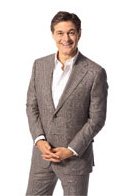Services
 By Mehmet Oz, MD
By Mehmet Oz, MD O, The Oprah Magazine
Q: Does acupuncture really work?
A: Those little pinpricks can be an effective way to manage pain. Specifically, studies show that acupuncture can alleviate the debilitating symptoms of osteoarthritis and fibromyalgia. There are several theories as to why acupuncture works. One is that it triggers the release of endorphins, part of the body's pain-control system. Another is that it increases blood flow to the areas of needle insertion. Regardless, find a practitioner who is certified by the National Certification Commission for Acupuncture and Oriental Medicine.
Ask Dr. Oz a question , plus find out how acupuncture can cure a headache.
What is the meaning behind Yin and Yang?
In Chinese medicine, health is represented by a balance of Yin and Yang. The theory behind this is these two forces represent the contradictory aspects of nature and because of this, one must be present to allow the other to exist. For example, on an emotional level, one would not know joy had they never experienced pain. The practice of Acupuncture and Chinese Medicine is to determine the exact nature of the imbalance, and then correct it through the use of acupuncture, herbal remedies, exercise, diet and lifestyle.
Acupuncture is particularly beneficial in the elimination of pain, particularly chronic pain. Common things that Acupuncture treats are neck and lower back pain, migraine headaches, sciatica, and pain in the hips, knees (including "arthritis"), ankles, shoulders (rotator cuff problems, bursitis etc.), elbows (tendonitis, tennis elbow etc.), wrists (carpal tunnel syndrome), as well as pain at the base of the spine, numbness and tingling anywhere in the body and more
Moxibustion
Moxibustion is a form of fire/heat treatment that stimulates specific acupuncture points of the body. The term is derived from the Japanese "mogusa" meaning herb (mugwort) and the Latin "bustion" meaning burning.
http://www.acupuncture-treatment.com/moxibustion.html
The purpose of moxibustion, as with most forms of traditional Chinese medicine, is to strengthen the blood, stimulate the flow of qi, and maintain general health. The basic principle is to place a glass cup or piece of moxa over the body at the specific acupuncture point for the illness being treated. The cup/moxa is then heated causing the blood to be stimulated (increasing the flow of qi,) "massaging" the internal organs of the patient.
http://www.johnnieters.com/ChineseMedicine/othe.html
The patient will experience a pleasant heating sensation that penetrates deep into the skin, but should not experience any pain.
http://www.acupuncturetoday.com/abc/moxibustion.php
Tui Na Massage
Tui Na is when the therapist uses hand techniques to massage the soft tissue muscles and tendons; acupressure techniques that directly affect the flow of qi. Herbal poultices, compresses, liniments, and salves are also used to enhance the effectiveness of the Tui Na massage.
http://tcm.health-info.org/tuina/tcm-tuina-massage.htm
Some Illnesses that Acupuncture and Herbal Medicine Can Treat
Chronic and Acute Pain : stiff neck, neck and back pain, sciatica, knee pain, lumbago, tooth pain, muscle pain, headaches, tennis elbow, cramps, sprains, bursitis, arthritis, tendonitis, carpal tunnel syndrome, fibromyalgia, sports injuries, rheumatoid arthritis.
Digestive System : ulcers, indigestion, stomach pain, loss of appetite, anorexia, hiccups, colitis, intestinal disorders, diarrhea, constipation, bloating, hemorrhoids, liver and gallbladder disorder, vomiting, food allergies.
Respiratory System : allergies, asthma, bronchitis, pneumonia , emphysema, laryngitis, sinusitis, rhinitis, cough colds, flu, sore throat, tonsillitis.
Circulatory System : cold limbs, swelling, edema, hypertension, hypotension.
Urinary System : overactive bladder, Benign prostatic hyperplasia , cystitis, urinary tract infections, involuntary loss of urine, difficulty urinating.
Genital system : painful menstruation, menstrual irregularities, cessation of menstruation, heavy menstruation, menopause, libido disorders, impotence, infertility.
Auditory and ocular system : some deafness , tinnitus, Meniere's syndrome , pain in the ears, myopia, dry eyes, conjunctivitis, some cases of sight loss, glaucoma.
Vegetative nervous system : nervousness, anxiety, insomnia, nervous tics, phobias, depression, general fatigue .
Nervous System : migraines , post-stroke recover, Bell's palsy , trigeminal neuralgia , myelitis, peripheral neuropathy, loss of balance, multiple sclerosis, epilepsy, Parkinson's ataxia, vertigo, tremors, numbness.
Dermatology System : eczema, shingles , boils, dermatitis, psoriasis, acne, hives.
Immune System : recurrent infections, supportive treatment for cancer and AIDS patients.
Addictions : addictions to nicotine, alcohol and drugs.
Others : diabetes, arteriosclerosis, cholesterol, hypoglycemia, hyperglycemia, anemia, weight control, facial rejuvenation .